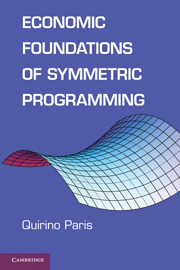Book contents
- Frontmatter
- Contents
- Foreword
- Preface
- 1 Introduction
- 2 Lagrangean Theory
- 3 Karush-Kuhn-Tucker Theory
- 4 Solving Systems of Linear Equations
- 5 Asymmetric and Symmetric Quadratic Programming
- 6 Linear Complementarity Problem
- 7 The Price Taker
- 8 The Monopolist
- 9 The Monopsonist
- 10 Risk Programming
- 11 Comparative Statics and Parametric Programming
- 12 General Market Equilibrium
- 13 Two-Person Zero- and Non-Zero-Sum Games
- 14 Positive Mathematical Programming
- 15 Multiple Optimal Solutions
- 16 Lemke Complementary Pivot Algorithm User Manual
- 17 Lemke Fortran 77 Program
- Index
3 - Karush-Kuhn-Tucker Theory
Published online by Cambridge University Press: 05 June 2012
- Frontmatter
- Contents
- Foreword
- Preface
- 1 Introduction
- 2 Lagrangean Theory
- 3 Karush-Kuhn-Tucker Theory
- 4 Solving Systems of Linear Equations
- 5 Asymmetric and Symmetric Quadratic Programming
- 6 Linear Complementarity Problem
- 7 The Price Taker
- 8 The Monopolist
- 9 The Monopsonist
- 10 Risk Programming
- 11 Comparative Statics and Parametric Programming
- 12 General Market Equilibrium
- 13 Two-Person Zero- and Non-Zero-Sum Games
- 14 Positive Mathematical Programming
- 15 Multiple Optimal Solutions
- 16 Lemke Complementary Pivot Algorithm User Manual
- 17 Lemke Fortran 77 Program
- Index
Summary
In the introduction chapter it was shown that the Euler-Legendre transformation defines duality relations for differentiable concave/convex problems without constraints. When constraints of any kind are introduced into the specification, the Lagrangean function represents the link between primal and dual problems.
At first, it would appear that the duality established by the new function has little to do with that of the Euler-Legendre transformation. As illustrated in Chapter 1, however, this is not the case. It is in fact possible to reestablish the connection by applying the Euler-Legendre transformation to the Lagrangean function and obtain a symmetric specification of dual nonlinear programs. The relationship among the various specifications of duality is illustrated in the flow chart of Figure 3.1.
Starting with unconstrained problems, we have seen in Chapter 1 that these models can, under certain conditions such as concavity and convexity, be analyzed by means of the Euler-Legendre transformation that exhibits a symmetry between the components of the original and the transformation functions. There follow problems subject to equality constraints that must be analyzed by means of the traditional Lagrange approach that presents an asymmetric structure as illustrated in Figure 2.1 of Chapter 2. When problems are constrained by inequality relations, the Karush-Kuhn- Tucker theory must be invoked. This theory uses the Lagrangean function, which is usually an asymmetric structure. However, we have already seen in Chapter 1 that the Lagrangean function can be subject to the Euler- Legendre transformation that provides a symmetrization of the original structure.
- Type
- Chapter
- Information
- Economic Foundations of Symmetric Programming , pp. 28 - 48Publisher: Cambridge University PressPrint publication year: 2010



